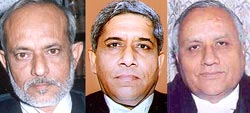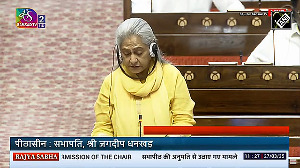 Their names have been splashed across the media in the last two weeks, and an entire nation is waiting with bated breath for their decision in the Ayodhya title suit. And the three judges of the Lucknow bench of the Allahabad high court will walk into court hall number 21 at 3.30 pm on Thursday to pronounce their verdict in the historic case.
Their names have been splashed across the media in the last two weeks, and an entire nation is waiting with bated breath for their decision in the Ayodhya title suit. And the three judges of the Lucknow bench of the Allahabad high court will walk into court hall number 21 at 3.30 pm on Thursday to pronounce their verdict in the historic case.
Justices Sudhir Agarwal, S U Khan and Dharam Veer Sharma will finally tell the nation who the disputed site belongs to.
Amid tight security at the high court, the three judges have been busy giving the finishing touches to the final order. Legal experts point out that they will ink the operative and final portion of the judgment on September 30 considering the sensitive nature of the issue.
The bench will read out the operative portion of the verdict at 3.30 pm in front of lawyers representing the parties to the suit. Once the judgment is read out, the aggrieved party can seek time to move the Supreme Court for a stay or could just abide by it and approach the apex court at a later date.
The Supreme Court can be approached as early as Friday, even if it means the litigants can access only the operative portion of the verdict. A new law states that a party can approach the Supreme Court with the operative portion instead of waiting for the complete certified copy of the verdict in matters of urgency.
This verdict, which is bound to go down in history just as the same court's verdict in 1974 unseating Prime Minister Indira Gandhi did, will be the last one for Justice D V Sharma, as the judge, who had passed the dissenting verdict in the deferment plea, will retire on October 1. An expert in civil laws, Justice Sharma is known to be a very religious person. Lawyers in Lucknow say that he is a simple man and even cooks his own food at home. After graduating in arts, he passed his LLB in 1970 and served as the chief law officer for the Uttar Pradesh financial corporation. Prior to being promoted as a district and sessions judge in 2002, he served as principal secretary in the parliamentary affairs department. He was appointed a judge of the Allahabad high court in 2005 and became a permanent judge in 2007.
Justice Khan, who was appointed as high court judge in 2002, graduated from the Aligarh Muslim University with a science degree in 1971. In 1975, he received his law degree and started his practice in the Aligarh civil court and later began his practice in the Allahabad high court before being promoted as a judge.
Justice Agarwal graduated in law from Meerut University in 1980 and commenced practice in the Allahabad high court immediately after. He was elevated in 2005 after serving as the additional advocate general in 2003. Justice Agarwal joined the bench comprising Justices Khan and Sharma in 2008. He specialised in taxation issues but was moved to civil cases later. Justices Khan and Sharma have been on this special bench since 2005.
Sharat Pradhan adds from Luchnow: As many as 18 judges have heard the Ayodhya case during its pendency of 21 years. Interestingly, as many as 15 judges who heard the case, retired during its pendency, following which it had to pass through 13 benches .
Image: (from left) Justices S U Khan, Sudhir Agarwal and Dharam Veer Sharma











 © 2025
© 2025